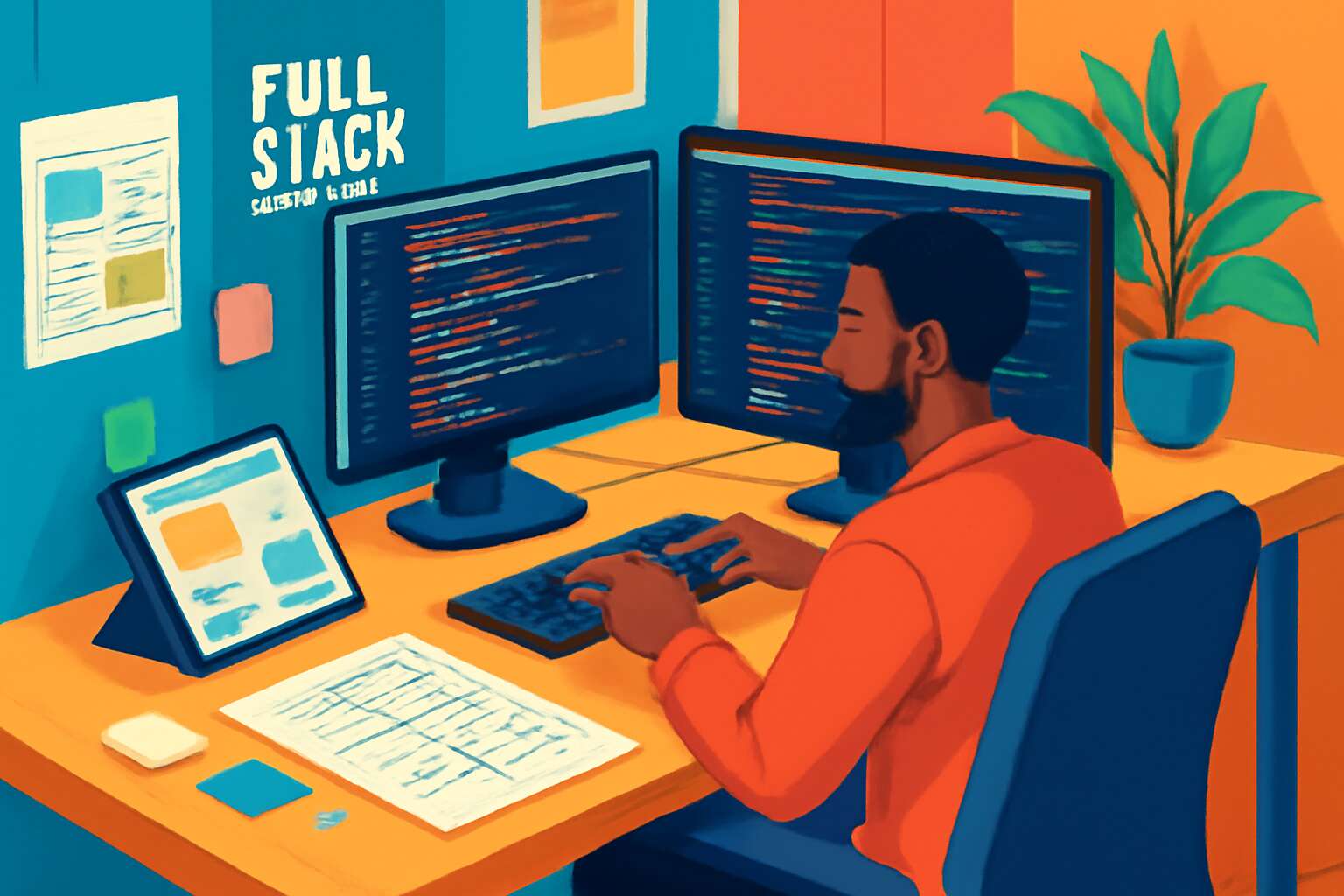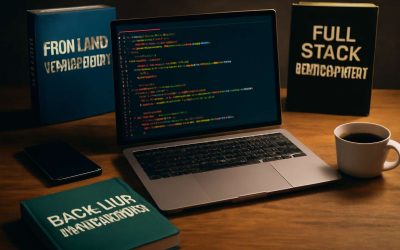Understanding the Role of a Full Stack Developer
What is a Full Stack Developer?
In the labyrinth of modern technology, the role of a full stack developer emerges as both a mythic quest and a daunting challenge. These professionals are the architects of digital worlds, wielding knowledge across front-end interfaces and back-end systems with equal finesse. But is being a full stack developer easy or hard? That question lingers like a shadow—an invitation to explore the depths of what truly lies beneath the surface of this multifaceted craft.
Understanding the role of a full stack developer requires more than just technical prowess; it demands an introspective grasp of human resilience and adaptability. They must navigate the complexities of diverse programming languages, frameworks, and tools—sometimes feeling like they are walking a tightrope suspended between two vast, contrasting worlds. Whether the journey feels more like an ascent or a descent depends on individual perspectives and the relentless pursuit of mastery.
- Mastering both the art of aesthetic design and the science of robust coding.
- Balancing speed with precision—an ongoing internal debate that shapes their daily existence.
- Adapting swiftly to ever-changing technologies, transforming doubt into confidence with each new challenge.
Core Skills Required
Understanding the role of a full stack developer reveals a tapestry woven with diverse skills and relentless adaptability. It’s not merely about coding; it’s about orchestrating harmony between the visual allure of front-end design and the intricate machinery of back-end systems. To truly grasp whether being a full stack developer is easy or hard, one must delve into the core skills that underpin this multifaceted craft.
At the heart of their expertise lies a mastery of programming languages such as JavaScript, Python, or Ruby, complemented by familiarity with frameworks like React or Node.js. The full stack developer must also navigate databases, server management, and deployment pipelines—each a vital thread in their complex web of responsibilities.
In this realm, a well-honed skill set might include:
- Proficiency in both front-end and back-end development
- Understanding of database architecture and data flow
- Experience with version control and deployment tools
Ultimately, whether the journey is labeled as easy or hard depends on one’s resilience and passion for continuous learning, for the landscape of technology is ever-shifting—demanding, yet exhilarating for those daring enough to embrace its challenges.
Typical Technologies and Tools
Understanding the role of a full stack developer requires more than just familiarity; it demands mastery over a suite of cutting-edge technologies and tools that keep the digital world spinning. In South Africa’s rapidly evolving tech landscape, the question often arises: full stack developer easy or hard? The answer isn’t straightforward, but it hinges on the mastery of a diverse arsenal of technologies.
Typical tools and frameworks form the backbone of this multifaceted role. For instance, front-end development often involves frameworks like React or Angular, which help craft intuitive user interfaces. On the back-end, Node.js, Python, or Ruby serve as the engines driving server-side logic. Database management is equally crucial, with tools like MySQL, PostgreSQL, or MongoDB enabling seamless data flow and storage.
Balancing these elements isn’t trivial, but it’s also not insurmountable. For those with unwavering resilience and a passion for continuous learning, the journey of becoming a full stack developer can transform from a daunting challenge into an exhilarating adventure. Ultimately, whether full stack developer easy or hard depends on individual dedication and adaptability in this ever-shifting technological landscape.
Challenges Faced by Full Stack Developers
Balancing Front-End and Back-End Development
Balancing front-end and back-end development is one of the biggest challenges faced by full stack developers. It’s not just about knowing both sides; it’s about mastering the nuances of each. The fluidity required to switch between designing user interfaces and managing server-side logic demands a versatile skill set. Sometimes, the complexity of integrating these layers can make the role feel like juggling flaming torches. Many wonder if full stack developer easy or hard is a fair question—truth is, it’s a demanding path that tests adaptability daily.
Developers often struggle with keeping up-to-date on rapidly evolving technologies and frameworks. The breadth of knowledge needed means they must constantly learn new skills and troubleshoot diverse issues. To navigate this, some adopt a systematic approach, such as:
- Prioritizing continuous learning.
- Developing a deep understanding of core principles.
- Staying organized amid the multitasking chaos.
While the role offers immense variety, it also demands resilience. Whether full stack developer easy or hard is ultimately a matter of perspective, but one thing remains clear—success hinges on a relentless drive to learn and adapt.
Keeping Up with Rapid Technology Changes
Staying ahead in the tech game often feels like trying to catch a greased pig—elusive, frustrating, yet oddly addictive. For full stack developers, keeping up with rapid technology changes is arguably the biggest hurdle. The digital landscape shifts faster than a South African rugby game—unexpected, intense, and demanding unwavering focus.
Technology stacks evolve, frameworks become obsolete faster than you can say “legacy code,” and new tools pop up like mushrooms after rain. This relentless pace makes the question of whether a full stack developer is easy or hard seem almost irrelevant; the real challenge lies in constant adaptation. Developers must continuously upgrade their skillset, often juggling multiple frameworks, languages, and best practices that seem to change overnight.
- Stay curious, or risk being left behind.
- Embrace a systematic approach to learning—think of it as your personal tech survival kit.
- Resilience becomes your best friend in the chaotic world of full stack development.
While some might argue that mastering both ends of the development spectrum is a recipe for burnout, others see it as a thrilling puzzle—one that demands a sharp mind and an even sharper sense of humor to survive. Ultimately, whether full stack developer easy or hard depends on your perspective, but one thing is certain: in this game, adaptability isn’t just a skill—it’s survival.
Managing Complex Projects
Managing complex projects can transform a full stack developer’s journey into a veritable odyssey. Imagine juggling a multitude of tasks—front-end interfaces shimmering with creativity, back-end engines humming with logic, and database systems quietly working behind the scenes. The challenge lies in harmonizing these elements into a seamless symphony, all while adapting to unpredictable shifts in project scope and technology.
The pressure to deliver robust, scalable solutions often feels like walking a tightrope above a chasm of deadlines. When every component depends on the others, a single misstep can ripple into chaos. In this whirlwind, maintaining clarity becomes essential; breaking down projects into manageable phases can be the difference between success and scramble.
While some may wonder if full stack developer easy or hard, the truth is that managing such intricate projects demands resilience, strategic thinking, and a dash of creative problem-solving—ingredients that make the role as challenging as it is rewarding.
Time and Resource Management
Managing time and resources is where the true test begins for many full stack developers. With a project’s scope constantly shifting, staying on top of deadlines can feel like chasing shadows in a labyrinth. The pressure to juggle multiple tasks—whether coding front-end interfaces or fine-tuning back-end logic—demands not only technical prowess but also impeccable organization.
Often, full stack developers find themselves faced with tight schedules and limited resources, forcing quick decisions and creative solutions. To succeed, they must master prioritization, ensuring that each component receives the right attention at the right moment.
Some might wonder if full stack developer easy or hard—truthfully, it’s a delicate dance. The challenge isn’t just in the coding but in managing these constraints, turning potential chaos into seamless progress. Only through resilience and strategic planning can a full stack developer navigate this demanding terrain successfully.
Is Becoming a Full Stack Developer Easy?
Learning Curve and Skill Acquisition
Many aspiring developers wonder whether becoming a full stack developer is an arduous journey or a manageable one. The truth is, the learning curve can feel steep at first, especially when grappling with new programming languages and frameworks. However, with dedication and a structured approach, the process becomes more approachable than it initially appears. It’s important to recognize that acquiring the necessary skills is not a sprint but a marathon—each small victory builds confidence and competence.
While some might see the path as full of obstacles, others find the challenge invigorating. The key lies in breaking down complex concepts into digestible steps. For example, mastering foundational technologies like HTML, CSS, and JavaScript might come quickly, but delving into back-end frameworks and databases takes patience and persistence. To navigate this journey, many find it helpful to follow a systematic learning plan that includes hands-on projects and continuous practice. Remember, the question isn’t simply whether full stack developer is easy or hard — it’s about how committed you are to the craft and whether you’re willing to embrace the learning process with all its ups and downs.
Educational Pathways and Resources
Many aspiring developers in South Africa find themselves asking, “Is becoming a full stack developer easy or hard?” The truth is, the journey isn’t a straightforward path—it’s a complex mosaic that tests patience and resilience. Some find the initial stages manageable, especially when focusing on core skills like HTML, CSS, and JavaScript. But as you delve deeper into back-end frameworks or database management, the challenge intensifies. It’s like walking through a labyrinth where each turn reveals new obstacles, yet offers moments of enlightenment.
The key lies in understanding that this journey isn’t about rushing to the finish line. Instead, it’s about embracing continuous learning and breaking down overwhelming concepts into achievable steps. Resources like online courses, coding bootcamps, and community forums can turn daunting topics into accessible milestones. Remember, whether full stack developer is easy or hard depends largely on your commitment—persistency turns the impossible into the inevitable!
Career Progression for Beginners
When pondering whether becoming a full stack developer is easy or hard, the truth is, it’s a bit of both—like trying to tame a wild beast that occasionally purrs. For beginners in South Africa, the journey often starts with a sense of excitement, but as you venture deeper into back-end frameworks or database management, the terrain becomes more rugged. It’s no secret that the path to mastery demands persistence, patience, and a healthy dose of humor.
Many new developers wonder if they can master this role without losing their sanity. The answer? It depends. If you’re willing to dedicate time and embrace continuous learning, the challenge transforms into a series of manageable milestones. Some find the initial stages manageable, especially when focusing on core skills like HTML, CSS, and JavaScript. But as you progress, the complexity ramps up—like climbing a ladder with a few loose rungs.
For those asking whether full stack developer easy or hard, the reality is that it’s a dynamic spectrum. The journey can be smooth sailing with the right resources, or an unpredictable maze that tests your resilience. The key is to stay committed and view setbacks as opportunities to learn. After all, in the realm of full stack development, persistence is the secret sauce that turns the seemingly impossible into the inevitable!
Is Being a Full Stack Developer Hard?
Technical Challenges and Problem-Solving
The question of whether being a full stack developer is easy or hard often sparks debate among aspiring tech professionals. The truth is, this role demands a relentless pursuit of mastery across a broad spectrum of skills, making it inherently challenging. It’s not just about coding; it’s about understanding the architecture of entire systems, anticipating user needs, and juggling multiple technologies seamlessly. This multifaceted nature can make some perceive it as an insurmountable mountain.
Technical challenges abound, especially when integrating diverse frameworks or troubleshooting complex bugs that span both front-end and back-end layers. Problem-solving becomes an art form—requiring patience, intuition, and a deep understanding of human logic. For many, the allure of mastering full stack development lies in embracing this complexity rather than avoiding it. Yet, it’s precisely this intricate dance with technology that continuously tests one’s limits and pushes the boundaries of what it means to be a developer.
Workload and Stress Factors
Being a full stack developer is often portrayed as a glamorous juggling act—think of it as the tech equivalent of a circus performer with too many balls in the air. The truth? It’s not exactly a walk in the park, especially when you factor in workload and stress. As projects pile up and deadlines loom, it’s easy to feel like you’re caught in a never-ending game of whack-a-mole.
Many wonder: is full stack developer easy or hard? Well, the answer hinges on resilience and adaptability. Managing a diverse workload, from front-end finesse to back-end robustness, can be overwhelming. But here’s the twist—those who thrive often develop a unique skill for prioritising tasks and embracing chaos.
- Juggling multiple frameworks
- Handling urgent bugs on different layers
- Maintaining work-life balance amid constant learning pressures
It’s a demanding role, no doubt. Yet, for those with a passion for continuous learning and problem-solving, it’s also incredibly rewarding. The question of whether full stack developer job is easy or hard ultimately depends on your mindset—and your ability to dance gracefully with complexity. After all, if you’re looking for a career that keeps your skills sharp and your adrenaline high, this path might just be perfect.
Maintaining a Wide Skill Set
Is being a full stack developer easy or hard? It’s a question that often echoes in the corridors of tech hubs across South Africa, where innovation pulses like a heartbeat. The truth is, maintaining a wide skill set demands a blend of resilience and curiosity. Juggling diverse technologies and frameworks feels akin to weaving a complex tapestry—each thread vital, each pattern unique.
For many, the challenge lies in mastering fluidity—adapting swiftly to new programming languages, frameworks, and tools that evolve at a relentless pace. Those who thrive often develop an intuitive sense of prioritisation, transforming chaos into a structured symphony. The key? Embracing continuous learning and viewing complexity as an opportunity rather than an obstacle. So, is full stack developer easy or hard? It’s a dance—sometimes graceful, sometimes tumultuous, but always rewarding for those willing to learn the rhythm.
Work Environment and Expectations
Is being a full stack developer easy or hard? For many in South Africa’s vibrant tech scene, this question sparks lively debates. The work environment for full stack developers tends to be fast-paced and demanding, requiring a high level of adaptability. Expectations often include juggling multiple roles—from front-end design to back-end architecture—which can feel like walking a tightrope over a sea of constantly shifting technologies.
What truly sets the stage for success is resilience. Embracing the unpredictable nature of the role and maintaining a curious mindset transforms potential chaos into a creative symphony. Some companies in South Africa foster collaborative atmospheres that encourage continuous learning, making the journey smoother. However, the workload and stress factors can be intense, especially when deadlines loom and projects demand swift problem-solving. So, is full stack developer easy or hard? It’s a delicate dance—challenging but equally rewarding for those willing to master its rhythm.
Pros and Cons of Being a Full Stack Developer
Advantages of Full Stack Development
Becoming a full stack developer is often seen as a double-edged sword. On one hand, the versatility of handling both front-end and back-end development opens doors to a broader range of projects and job opportunities. This flexibility can lead to faster career growth and greater job security, especially in dynamic markets like South Africa. However, the question remains: is full stack developer easy or hard? Many find the path rewarding but demanding, as juggling multiple skills requires significant dedication and continuous learning.
One of the key advantages of full stack development is the ability to see a project through from start to finish, providing a comprehensive understanding of the entire tech stack. But this breadth also means managing a wide array of technologies and problem-solving across different layers of development. For those who thrive on variety and intellectual challenge, this can be very satisfying. Yet, it’s important to recognize that the workload can become overwhelming without proper prioritization and time management. Ultimately, whether full stack developer easy or hard depends on individual aptitude and the support systems available, but it’s undeniable that the role demands resilience and adaptability.
Limitations and Downsides
Embarking on the journey to become a full stack developer is often likened to climbing a technological Everest—challenging yet immensely rewarding. The pros are compelling: versatility, a broader skill set, and the ability to oversee entire projects from conception to deployment. However, this path isn’t without its pitfalls. One key downside is the potential for burnout, as managing both front-end and back-end responsibilities can stretch even the most dedicated developers thin.
Limitations of being a full stack developer often emerge in the form of scope creep. Juggling multiple domains can lead to diluted expertise, making it difficult to master niche areas. Additionally, the constant need to stay updated with an evolving tech landscape can be taxing. For many, the question remains—full stack developer easy or hard? The answer hinges on personal aptitude, resilience, and the support systems in place. Regardless, it’s clear that this role demands a unique blend of adaptability and perseverance, especially within competitive markets like South Africa.
Career Tips for Aspiring Full Stack Developers
Best Practices for Learning
Embarking on the journey to become a full stack developer often sparks a debate: is it easy or hard? The truth lies somewhere in the middle, shaped by dedication and strategic learning. For aspiring developers, understanding the nuances of this career path can make all the difference. It’s not just about mastering coding languages but cultivating a mindset that embraces continuous growth and adaptability.
One of the best practices for learning full stack development involves immersing oneself in diverse projects. This real-world exposure accelerates skill acquisition and reveals the interconnectedness of front-end and back-end tasks. To streamline this process, consider following a structured approach:
- Start with foundational programming languages like HTML, CSS, and JavaScript.
- Progress to server-side technologies such as Node.js or Python.
- Consistently build and deploy projects to solidify your understanding.
While the learning curve may seem steep initially, perseverance and strategic practice reveal that the path to becoming a full stack developer can be navigated with relative ease. Ultimately, whether the journey feels easy or hard depends on your mindset, resources, and commitment to continuous learning.
Building a Portfolio
Building a compelling portfolio as an aspiring full stack developer is akin to laying a mosaic—each piece, each project, contributes to a vivid tableau of your evolving expertise. In South Africa’s competitive tech landscape, showcasing a diverse array of work not only demonstrates technical proficiency but signals resilience and adaptability—traits essential for navigating the complex terrain of full stack development.
A strategic approach involves curating projects that highlight both front-end finesse and back-end robustness. Consider integrating real-world applications, open-source contributions, or freelance assignments that reflect your growth. To streamline this process, many recommend an ordered progression:
- Start with personal projects that solve tangible problems, emphasizing your grasp on core languages like HTML, CSS, and JavaScript.
- Gradually add complexity by deploying full-stack frameworks such as React paired with Node.js or Python.
- Document each step meticulously, creating a narrative of your technical journey that resonates with potential employers or clients.
While some may wonder if full stack developer easy or hard, the truth hinges on your persistence and the richness of your portfolio. The more nuanced your work, the clearer your mastery becomes, transforming the daunting into the attainable. Building this portfolio is not just about showcasing skills; it’s about weaving your unique story into the fabric of the digital ecosystem, illustrating that the journey from novice to full stack developer, although demanding, is profoundly rewarding.
Continuous Learning and Upskilling
In the labyrinth of modern technology, the question lingers—full stack developer easy or hard? The answer is woven from the threads of relentless curiosity and unwavering dedication. Continuous learning stands as the cornerstone, a beacon guiding aspiring developers through the fog of rapid innovation. In South Africa’s vibrant tech ecosystem, those who embrace upskilling find themselves transforming obstacles into stepping stones.
To thrive in this dynamic landscape, it’s vital to cultivate a growth mindset. Engage with diverse educational pathways, whether through online courses, boot camps, or tech communities. Remember, mastery is a journey, not a destination. An effective way to sustain momentum is by setting incremental goals, each building upon the last, creating a tapestry of progress that keeps motivation alive.
Moreover, immersing oneself in real-world projects, open-source collaborations, or freelance assignments not only sharpens skills but also fortifies resilience. As the digital realm evolves, so should your skill set—think of upskilling as a continuous dance, where every step brings you closer to becoming a confident full stack developer. Ultimately, the pursuit of excellence in full stack development is less about the ease or difficulty and more about the passion to evolve amidst the ever-changing currents of technology.
Conclusion: Is Full Stack Development Easy or Hard?
The question of whether a full stack developer is easy or hard to become remains a tantalizing enigma, especially in South Africa’s rapidly evolving tech landscape. It’s a journey marked by moments of clarity and confusion—challenging yet profoundly rewarding. The complexity lies not only in mastering diverse technologies but also in navigating the psychological toll of constant learning and adaptation. To some, the role feels like an intricate dance, demanding both technical finesse and a resilient mind.
While many perceive the path as arduous, there are undeniable rewards for those who persevere. The multifaceted nature of full stack development—spanning front-end finesse and back-end robustness—can be overwhelming, yet it fosters a unique versatility that’s highly sought after. So, is it really easy or hard? Perhaps the answer hinges on one’s mindset, curiosity, and capacity for continuous growth. In the end, the journey of a full stack developer is less a question of difficulty and more a testament to relentless resilience and passion for innovation.




0 Comments